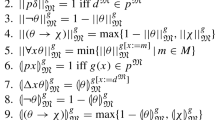Abstract
The positive closure operator is defined on using the logical formulas containing the logical connectives ∨, & and the quantifier ∃. Extensions of the positive closure operator are considered by using arbitrary (and not necessarily binary) logical connectives. It is proved that each proper extension of the positive closure operator by using local connectives gives either an operator with a full systemof logical connectives or an implication closure operator (extension by using logical implication). For the implication closure operator, the description of all closed classes is found in terms of endomorphism semigroups.
Similar content being viewed by others
References
A. V. Kuznetsov, “On the Tools for Detection of Nondeducibility and Nonexpressibility,” in Logical Inference (Nauka, Moscow, 1979), pp. 5–33.
A. F. Danil’chenko, “On Parametric Expressibility of Three-Valued Logic Functions,” Algebra Logika 16 (4), 397–416 (1977).
S. Barris, “Primitive Positive Clones Which Are Endomorphism Clones,” Algebra Univers. 24, 41–49 (1987).
S. Barris and R. Willard, “Finitely Many Primitive Positive Clones,” Proc. Amer. Math. Soc. 101 (3), 427–430 (1987).
A. F. Danil’chenko, “On Parametrical Expressibility of the Functions of k-Valued Logic,” Colloq. Math. Soc. János Bolyai 28, 147–159 (1981).
M. Hermann, “On Boolean Primitive Positive Clones,” DiscreteMath. 308, 3151–3162 (2008).
J. W. Snow, “Generating Primitive Positive Clones,” Algebra Univers. 44, 169–185 (2000).
L. Szabó, “On the Lattice of Clones Acting Bicentrally,” Acta Cybernet. No. 6, 381–388 (1984).
S. S. Marchenkov, “On Expressibility of Functions of Many-Valued Logic in Some Logical-Functional Languages,” Diskretn. Mat. 11 (4), 110–126 (1999) [DiscreteMath. Appl. 9 (6), 563–581 (1999)].
S. S. Marchenkov, “Definition of Positively Closed Classes by Endomorphism Semigroups,” Diskretn. Mat. 24 (4), 19–26, (2012) [DiscreteMath. Appl. 22 (5–6), 511–520 (2012)].
S. S. Marchenkov, “On the Extensions of Parametric Closure Operator by Means of Logical Connectives, Izv. Vyssh. Uchebn. Zaved. Povolzh. Reg. Fiz.-Mat. Nauki No. 1, 22–31 (2017).
Author information
Authors and Affiliations
Corresponding author
Additional information
Original Russian Text © S.S. Marchenkov, 2018, published in Diskretnyi Analiz i Issledovanie Operatsii, 2018, Vol. 25, No. 4, pp. 46–58.
Rights and permissions
About this article
Cite this article
Marchenkov, S.S. Extensions of the Positive Closure Operator by Using Logical Connectives. J. Appl. Ind. Math. 12, 678–683 (2018). https://doi.org/10.1134/S1990478918040087
Received:
Accepted:
Published:
Issue Date:
DOI: https://doi.org/10.1134/S1990478918040087



